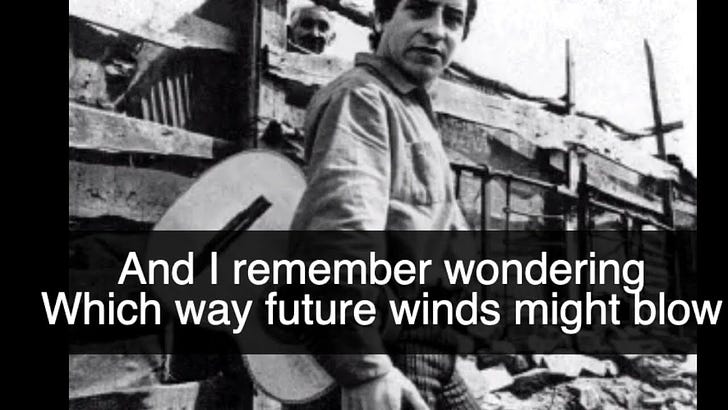Hi all,
Thank you for joining me for this week’s song, Santiago by David Rovics. The purpose of this song is to teach others about a time in Chilean history, from about 1970 to 1973. It explains the changes that occurred in the country as a result of a coup d’état that was supported by the U.S.
If you’d like to hear the song before you read the background, I’ve included a YouTube video below the article.
Below, you’ll find my interpretation of the lyrics. Note that this song tells the story of what happened from the perspective of the supporters of Allende and the new government. Comments and questions are welcome. Please be respectful of others’ opinions if they should differ from yours.
For Japanese students, vocabulary words in bold are provided in Japanese below.
The Song
(619 words)
The song begins with the singer looking outside on a clear morning. Suddenly, the air became dark: At the planes that flew so low / At the smoke that rose so high. When he looked at the calendar, he saw it was September 11, or 9-11, the day that the Twin Towers in New York were hit by planes. He thought that September 11 in 2001 and the September 11 in 1973 in Chile were similar.
Thirty years had passed. Here, the songwriter describes what Santiago was like in the early 1970s. There were many teachers and doctors then. People in poor neighborhoods (shanties) were able to receive food. Many people in Santiago were excited because they had elected a president they liked, Salvador Allende, and he was making many changes in the country that people supported (rallies in the streets) because they saw he was trying to end poverty in their country: Destitution was the past. He was making rapid changes in society. Just how fast they were changing, only Kissinger could know refers to Henry Kissinger. (At the time, the president of the U.S. (1969-1974) was Richard Nixon. His Secretary of State was Henry Kissinger.) Kissinger did not like those changes because the Chilean government was leaning toward a socialist state.
The Chilean people wanted their society to provide good places to live and the basic things they lacked such as food, education, jobs, and medical care. The people chose Allende, elected free and fair, because they believed he would help them. However, there were many businesses in Chile that were owned by foreign companies, for example, an American mining company, Anaconda Copper. This company was mining copper ore and making huge profits which they took out of Chile. President Allende thought those resources and their profits should go to the people of Chile, so he nationalized the company, making the company part of Chile’s government.
The American government supported a man from Chile who had been trained at the military School of the Americas in Ft. Benning, Georgia, in the U.S. His name was General Pinochet.
The lyrics describe what happened: They dropped bombs on La Moneda with jet planes from DC. General Pinochet and the army, supported by military sent from Washington, D.C., attacked Santiago and bombed La Moneda, which is a building like the White House in the U.S. Five thousand people were killed during the coup d’etat. One of those people was Victor Jara, a musician who wrote songs and played the guitar. He supported Allende and often sang at rallies for the president.
Victor Jara grew up very poor. He wanted his country to be a place where everyone, not only the rich people, had enough to eat, could go to school, and live a healthy life. The army arrested, tortured and killed Victor Jara. They were very cruel to him, and in the end, they cut off his hands, not literally, but figuratively. This sent a strong message to Allende’s supporters that the country would no longer support them.
General Pinochet was a dictator who was in power for many years. Under his government, he made it very easy for the U.S. and other countries to enter Chile and exploit its resources. He banned unions and privatized many Chilean companies that used to belong to the people.
His abuses during his dictatorship led to the largest human rights campaigns in history. In 1998, Pinochet was arrested in London for crimes against humanity. It was the first time the leader of a country had ever been arrested in a foreign country for international crimes. He returned to Chile and faced accusations of crimes. He was held under house arrest and died in 2006.
VOCABULARY
coup d’état クーデター
rally 集会
destitution 貧困
leaning toward a socialist state 社会主義国家への傾斜
copper ore 銅鉱
resources 資源
nationalize を国営[国有]化する
arrest 逮捕
torture 拷問
cruel 残酷な
figuratively 例えて言うと
dictator 独裁者
exploit 搾り取る
ban 禁止
privatize を民営化する
ban 禁止する
abuse 乱用
accusation 告訴
house arrest 自宅軟禁
Learn more about David Rovics at https://www.davidrovics.com/ and here on Substack at https://davidrovics.substack.com/




